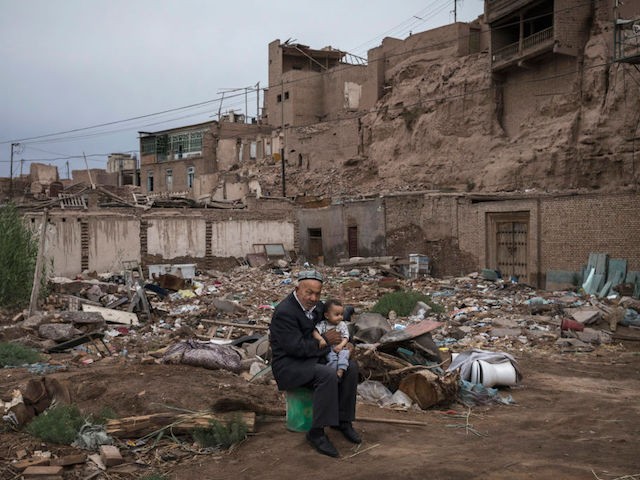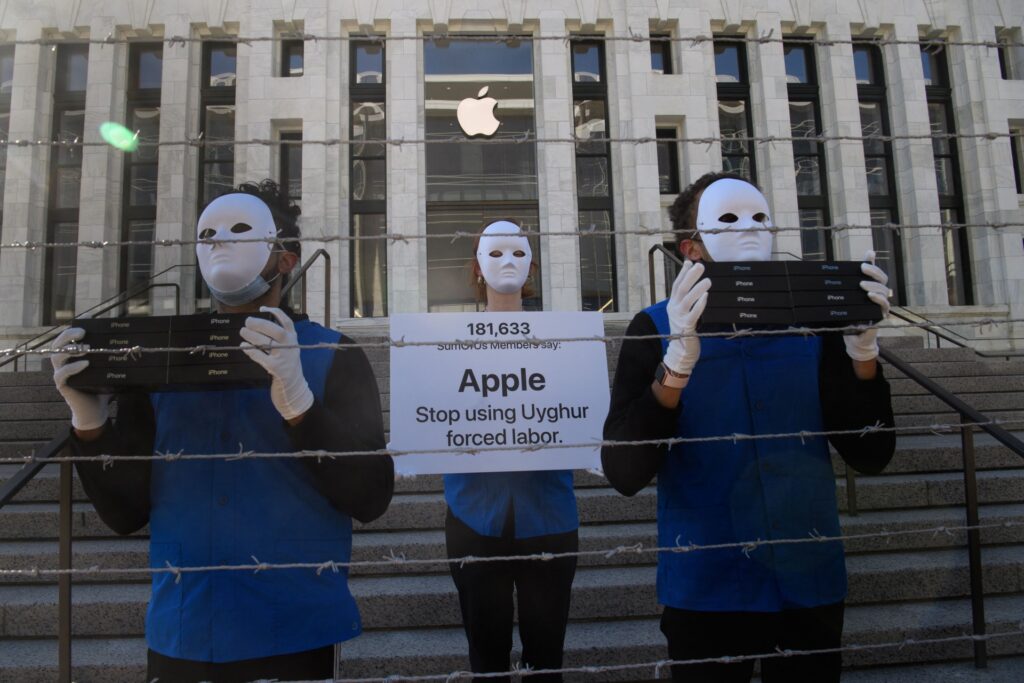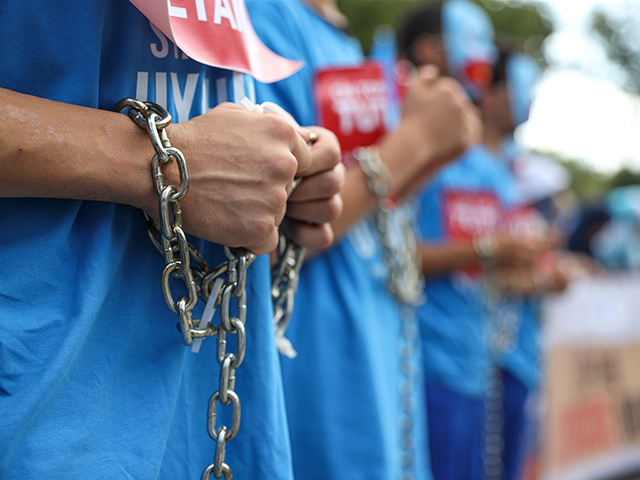The United Nations’ top official on slavery declared in a world report made public on Tuesday that the Chinese Communist Party was actively enslaving members of non-Han ethnic groups in East Turkistan, an occupied region west of China, and has likely engaged in similar activities in Tibet.
Special Rapporteur on Contemporary Forms of Slavery Tomoya Obokata wrote in a wide-ranging report condemning everything from Boko Haram terrorists taking child brides to “inequality” in the United States that, based on the overwhelming evidence, it was “reasonable” to conclude that the Communist Party was systematically enslaving people through two policies: the establishment of its concentration camps, which China calls “vocational training centers,” and through a “poverty alleviation” program in which China buses slaves out of East Turkistan to factories around the country.
Obokata’s report is the first formal report by the United Nations to address human rights concerns in East Turkistan after a visit by the United Nations High Commissioner for Human Rights Michelle Bachelet to China in May. Bachelet has yet to issue a report on her findings there despite widespread demand from human rights activists and the communities of indigenous people of East Turkistan. While in China, Bachelet said she “admired” the Communist Party’s “achievements” in human rights and claimed that Beijing had shut down its massive concentration camp system in East Turkistan. The Communist Party has reportedly pressured Bachelet not to release a report.
Obokata’s report – dated July 19 but released to the public this week – covers a long list of practices considered “contemporary forms of slavery,” from forced labor to sex trafficking to domestic servitude. On the situation in China, Obokata wrote, “the Special Rapporteur regards it as reasonable to conclude that forced labour among Uighur, Kazakh and other ethnic minorities in sectors such as agriculture and manufacturing has been occurring in the Xinjiang Uighur Autonomous Region of China.”
Xinjiang is the Chinese regime’s name for East Turkistan.
“Based on an independent assessment of available information … Two distinct State mandated systems exist,” the special rapporteur detailed, “(a) the vocational skills education and training centre system, under which minorities are detained and subjected to work placements; and (b) the poverty alleviation through labour transfer system, where surplus rural labourers are transferred into secondary or tertiary sector work.”

Members of Muslim Uyghur minority present pictures of their relatives detained in China during a press conference in Istanbul, on May 10, 2022. (OZAN KOSE/AFP via Getty Images)
Obokata added that he had compiled evidence of “similar arrangements” to enslave people in Tibet, “where an extensive labour transfer programme has shifted mainly farmers, herders and other rural workers into low-skilled and low-paid employment.”
China’s “vocational skills education and training centers” are, in reality, concentration camps for Uyghurs, Kazakhs, and other non-Han ethnic groups that dominate in East Turkistan. Survivors have detailed a long list of human rights atrocities that the camp victims are subject to, including slavery as well as communist indoctrination, torture, gang rape, forced sterilization, and testing consistent with live organ harvesting.

An ethnic Uyghur man holds his grandson as he sits outside his house in an area waiting development by authorities on June 28, 2017 in the old town of Kashgar, in the far western Xinjiang province, China.(Kevin Frayer/Getty Images)
The Uyghur Tribunal, an independent group of human rights legal experts, concluded last year after reviewing evidence and interviewing camp survivors that China was committing genocide against East Turkistan’s population “beyond a reasonable doubt.”
The “poverty alleviation” system sells camp survivors and other East Turkistan residents as slaves to Chinese companies nationwide. The nature of the system has been known since at least 2020, when the Australian Strategic Policy Institute (ASPI) published the landmark report “Uyghurs for Sale” showing online advertisements selling Uyghur slaves to factories around the country. The ASPI report listed 83 international companies — including household names such as Nintendo, BMW, Apple, and Nike — as using Chinese suppliers for product parts implicated in the Uyghur slave trade. The British broadcaster Sky News documented the practice as ongoing last year, finding Chinese websites selling “batches of 50 to 100” Uyghur slaves to factories.

Activist set up a mock Uyghur forced labor camp outside the Apple flagship store on March 4, 2022, in Washington, DC. – Demonstrators called on tech giant Apple to stop using Uyghur forced labor. (NICHOLAS KAMM/AFP via Getty Images)
Survivors of communist repression in Tibet have documented the implementation of a similar enslavement and camp system in that occupied region. In 2020, a study by the Jamestown Foundation compiled evidence indicating that China had forced as many as half a million Tibetans into camps similar to those in East Turkistan.
“50,000 have been transferred into jobs within Tibet, and several thousand have been sent to other parts of China,” the report revealed.
In his report this week, Obokata accused China of using “excessive surveillance, abusive living and working conditions, restriction of movement through internment, threats, physical and/or sexual violence and other inhuman or degrading treatment” to subdue its slaves, concluding that “some instances may amount to enslavement as a crime against humanity.”
Elsewhere in the report, Obokata lamented “income gaps among different ethnic groups in the United States of America” and “domestic servitude” throughout Latin America, particularly in Brazil and Colombia. He offered America praise for passing the Uyghur Forced Labor Prevention Act (UFLPA), which bans imports from East Turkistan without importers offering proof that slaves did not make the products in question, and also praised Qatar and Saudi Arabia for passing laws allegedly improving migrant worker conditions.
Obokata’s findings differ from what Michelle Bachelet claimed to have found in East Turkistan. During her visit in May, Bachelet echoed Chinese Communist propaganda, praising the “poverty alleviation” program that Obokata referred to as a form of slavery.
“Poverty alleviation and the eradication of extreme poverty, 10 years ahead of its target date, are tremendous achievements of China,” Bachelet said at the time. “The introduction of universal health care and [an] almost universal unemployment insurance scheme go a long way in ensuring protection of the right to health and broader social and economic rights.”
Bachelet also claimed that the Chinese government had “dismantled” the region’s concentration camps.
Bachelet’s silence has prompted protests by Uyghur groups outside of the United Nations, who demand a formal report on her findings. Bachelet’s office has made no overt moves regarding writing, much less publishing, such a report, and Bachelet announced shortly after the outcry that she would step down from her post after her term expired despite being eligible for a second term.
The Chinese Foreign Ministry dismissed Obokata’s report on Wednesday as “lies and disinformation.”
“Certain special rapporteur chooses to believe in lies and disinformation about Xinjiang spread by the US and some other Western countries and anti-China forces,” Foreign Ministry spokesman Wang Wenbin railed, “abuse his authority, blatantly violate the code of conduct of the special procedure, malignly smear and denigrate China and serve as a political tool for anti-China forces. China strongly condemns this.”
“We solemnly urge certain special rapporteur to immediately change course, respect plain facts, observe the mandate of the Human Rights Council and code of conduct of the special procedure,” Wang demanded, “perform duty in a fair and objective manner, stop using lies to stoke confrontation and create division, stop politicizing and instrumentalizing human rights issues, and stop serving certain countries’ political scheme to suppress and contain China by abusing the UN platform.”

COMMENTS
Please let us know if you're having issues with commenting.